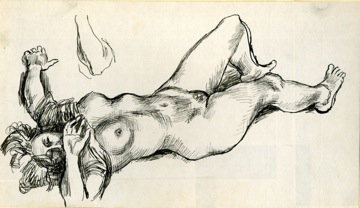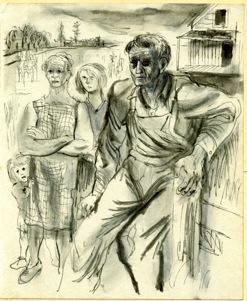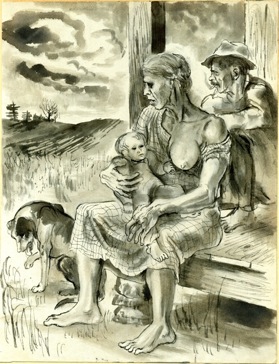the work of David Fredenthal, 26-year-old painter:
"That boy could draw my Tobacco Road people."
A casual comment, it was enormously productive.

The young painter was just finishing a two-year
Guggenhcim Fellowship, preceded by a year's
study in Paris, two one-man shows at New York's
Downtown Gallery, and a fellowship at the Cranbrook
Academy near Detroit. He was out in Colorado
Springs when he heard what Caldwell had said about him.
Fredenthal hadn't read Tobacco Road. He had not
even seen the play - now breaking all records in its
seventh year on Broadway. But he swapped
a portrait for a second-hand Ford and headed East.
In New York he learned that Dnell, Sloan & Pearce
were bringing out a deluxe edition of Tobacco Road.
But he had no entrée to the publishers, and Caldwell,
to his disappointment, was out of town. So he drove on
to Georgia to have a look at the Tobacco Road people.

He found Dr. I. C. Caldwell, the author's father, in Wrens,
Ga., going on his ministerial rounds among people like the
Lesters. Fredenthal got a room from a couple who ran a
1-pump filling station—and stayed two months.
He is a direct and unaffected person, not a prober into
social problems. He asked no questions - just looked.
At night he stopped at the town's bar, sat at a corner table,
and drew what he had seen that day: sick people, unable to
mend because of lack of nourishment; an old palsied woman
picking peas to get money for the medicine the doctor
ordered: families housed five in a room - plus a cur dog or two;
families at table; men skinning down a pig; women gathering
fire woods; some just settin', or making away with a jug of corn.
These drawings he sent back to Caldwell. Caldwell turned them
over to the publishers, who sent for the artist and ordered 40-odd
pen and ink drawings and six in color to illustrate the text.
When the publishers said some of the finished drawings were
too raw—contained too many buttocks—Caldwell said: "Give
the kid a free hand. He's seen it. He knows what he's drawing."

The publication of the new edition of Tobacco Road. on Nov. 8
is a moment of triumph for young Fredenthal. He grabbed the ball
and ran off ahead of a field of Bentons and Woods and
many bcttcr-known artist-illustrators.
Now he likes to illustrate books. Books about elemental people.
He can draw from vivid memories: sailors on the Great Lakes,
freighters, men on the Ford Plant assembly line, denizens of
flop houses where he lived when distributing Christmas cards
for $4 a week. He can draw his fellow C.C.C. workers in the
first gang to go out in '33 - laying lines, building roads and
state parks, fighting fire.
Like most artists, Fredenthal is a hopelessly bad businessman
and always broke. "Anyway", he says, "there's a regular pay
check to be had from the army - if it has to come to that "
- Maude Riley
CUE - The Weekly Magazine of New York Life (vol. 9 #46, Nov. 1940)